介词和连词的用法及专项练习
介词连词练习题
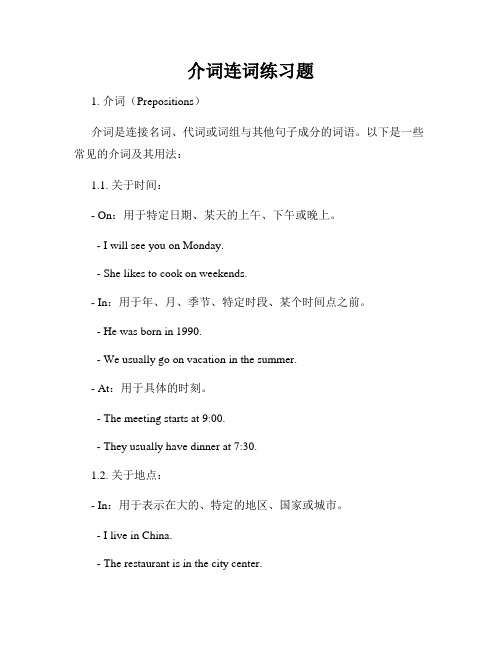
介词连词练习题1. 介词(Prepositions)介词是连接名词、代词或词组与其他句子成分的词语。
以下是一些常见的介词及其用法:1.1. 关于时间:- On:用于特定日期、某天的上午、下午或晚上。
- I will see you on Monday.- She likes to cook on weekends.- In:用于年、月、季节、特定时段、某个时间点之前。
- He was born in 1990.- We usually go on vacation in the summer.- At:用于具体的时刻。
- The meeting starts at 9:00.- They usually have dinner at 7:30.1.2. 关于地点:- In:用于表示在大的、特定的地区、国家或城市。
- I live in China.- The restaurant is in the city center.- On:用于表示在街道、大街、公路等具体地点。
- The post office is on Main Street.- The accident happened on the highway.- At:用于表示在具体的建筑、地址或地方。
- She is waiting for you at the cinema.- They will meet at the coffee shop.1.3. 关于方式:- By:用于表示通过某种交通工具、方式或手段。
- I usually go to work by bus.- We communicate by email.- With:用于表示携带某物或与某人一起。
- He always goes to the gym with his friends.- She wrote the letter with a pen.2. 连词(Conjunctions)连词是连接两个词、短语、从句或句子的词语。
介词和连词的用法及专项练习

介词和连词的用法(一)表示时间的介词1.英语里最常见的时间介词有:at, in, on, before, after和from。
2.at , in和on这三个词都表示时间。
✧at主要指具体的钟点:at half past eight 在八点半✧in一般指某一段时间:in January 在一月份✧on指具体在某一天:on Monday 在星期一3.before和after表示时间的先后顺序。
✧before表示“在……之前”。
You should wash your hands before eating. 吃饭前你应该洗手。
✧after表示“在……之后”。
They often play basketball after dinner. 他们放学后经常打篮球。
4.from作时间介词含有“从……开始”的意思,常和to连用,组成“from…to…”的结构,表示“从……到……”的意思。
We go to school from Monday to Friday. 我们从周一到周五上学。
(二)表示方位的介词,也就是表示位置和地点的介词。
1.小学阶段常见的方位介词有:on, in, at, under, over, above, below, about, around,between等。
2.on, over和above这三个词都有“在……上面”的意思,但它们所表示的方位还是有些不同。
✧on表示两个物体的表面相互接触。
如:There is a book on the desk. 桌上有一本书。
The boy is sleeping on the desk. 那个孩子睡在地上。
✧over表示“在……的正上方”,两个物体表面没有接触。
如:There is a light bulb over my head. 在我头顶上有一个灯泡。
✧above表示两个物体中一个在另一个的上方,如:The plane is flying above the clouds. 飞机上云层上飞行。
2022高考英语语法--介词连词讲解及习题(附答案)
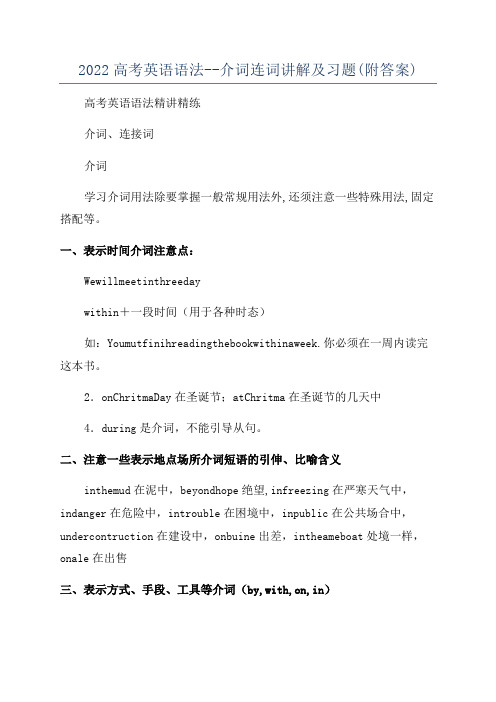
2022高考英语语法--介词连词讲解及习题(附答案)高考英语语法精讲精练介词、连接词介词学习介词用法除要掌握一般常规用法外,还须注意一些特殊用法,固定搭配等。
一、表示时间介词注意点:Wewillmeetinthreedaywithin+一段时间(用于各种时态)如:Youmutfinihreadingthebookwithinaweek.你必须在一周内读完这本书。
2.onChritmaDay在圣诞节;atChritma在圣诞节的几天中4.during是介词,不能引导从句。
二、注意一些表示地点场所介词短语的引伸、比喻含义inthemud在泥中,beyondhope绝望,infreezing在严寒天气中,indanger在危险中,introuble在困境中,inpublic在公共场合中,undercontruction在建设中,onbuine出差,intheameboat处境一样,onale在出售三、表示方式、手段、工具等介词(by,with,on,in)1.by:Theblindmenthoughttheycouldlearnwhattheelephantlookedli kebytouchingit./makealivingbyteaching/byhand手工地,靠手工地,byletter,bypot,byelectricity,learnth.byheart,truckbythebeauty因美丽而着迷Hewapaidbythehour/theday/month/…他按时/日/月/…被付给工钱。
byplane/train/hip/air/water/ea/…,bymeanof用…手段,方式;bywayof经由,取道于…learnEnglihby/over/throug h/ontheradio2.on:liveonfood,kneelonone¢knee,lie/leeponone¢back/ide/face 仰/侧/俯卧(睡)3.in:inEnglih,inink,inilence,inonevoice异口同声地,inahurry 匆忙地,inurprie惊讶地4.with:writewithapen,workwithone¢hand,mellwithone¢noe,beatt hehorewithawhip(鞭子)四、相近介词(短语)辨析about“关于”,知识性或随便谈论:adicuionabouttheplan3.over在…正上方,under在…正下方above在…上面(不一定垂直上方),below在…下面4.inanhour一小时后,用于将来时afteranhour一小时后,用于过去时5.beide在…旁边beide除…之外(还有)e某cept除…之外e某ceptfor除(非同类事物)之外6.on/inthetreetat50DongfengRoad在东风路50号高考英语语法精讲精练7.aholeinthewallapictureonthewallapieceofnewinthenewpaperthewordintheenvelopthemonkeyinthetreetheappleonthetree(树上的苹果。
介词与连词讲解与练习(答案)
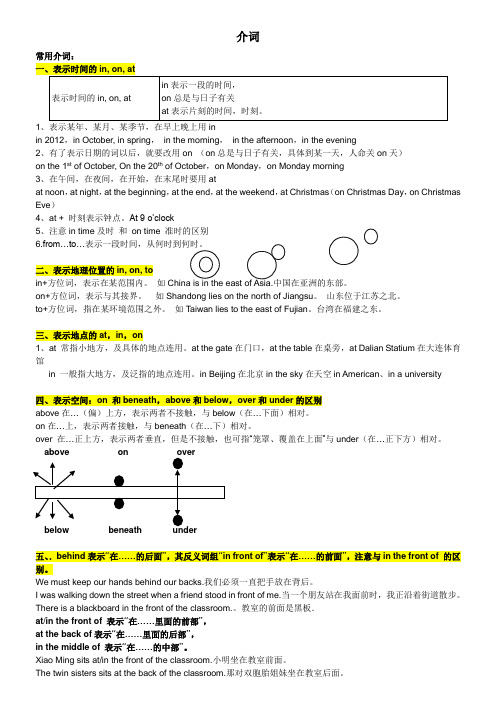
介词常用介词:1、表示某年、某月、某季节,在早上晚上用inin 2012,in October, in spring,in the morning,in the afternoon,in the evening2、有了表示日期的词以后,就要改用on (on总是与日子有关,具体到某一天,人命关on天)on the 1st of October, On the 20th of October,on Monday,on Monday morning3、在午间,在夜间,在开始,在末尾时要用atat noon,at night,at the beginning,at the end,at the weekend,at Christmas(on Christmas Day,on Christmas Eve)4、at + 时刻表示钟点。
At 9 o’clock5、注意in time及时和on time 准时的区别6.from…to…二、表示地理位置的in, on, toin+方位词,表示在某范围内。
如on+方位词,表示与其接界。
如Shandong lies on the north of Jiangsu。
山东位于江苏之北。
to+方位词,指在某环境范围之外。
如Taiwan lies to the east of Fujian。
台湾在福建之东。
三、表示地点的at,in,on1、at 常指小地方,及具体的地点连用。
at the gate在门口,at the table在桌旁,at Dalian Statium在大连体育馆in 一般指大地方,及泛指的地点连用。
in Beijing在北京in the sky在天空in American、in a university四、表示空间:on 和beneath,above和below,over和under的区别above在…(偏)上方,表示两者不接触,与below(在…下面)相对。
小学专项练习介词与连词练习题及
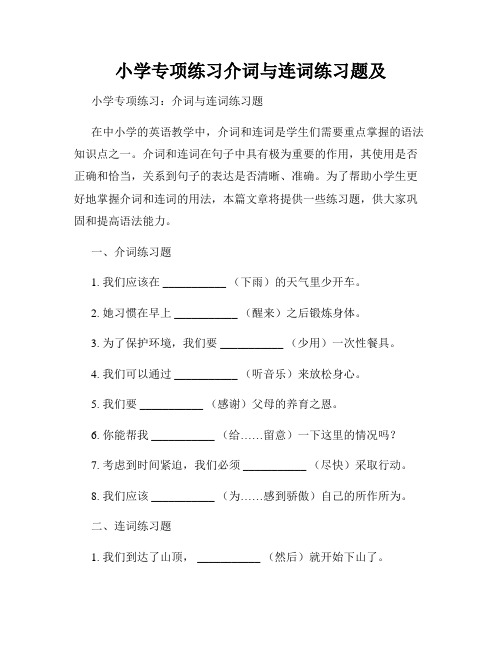
小学专项练习介词与连词练习题及小学专项练习:介词与连词练习题在中小学的英语教学中,介词和连词是学生们需要重点掌握的语法知识点之一。
介词和连词在句子中具有极为重要的作用,其使用是否正确和恰当,关系到句子的表达是否清晰、准确。
为了帮助小学生更好地掌握介词和连词的用法,本篇文章将提供一些练习题,供大家巩固和提高语法能力。
一、介词练习题1. 我们应该在 ___________ (下雨)的天气里少开车。
2. 她习惯在早上 ___________ (醒来)之后锻炼身体。
3. 为了保护环境,我们要 ___________ (少用)一次性餐具。
4. 我们可以通过 ___________ (听音乐)来放松身心。
5. 我们要 ___________ (感谢)父母的养育之恩。
6. 你能帮我 ___________ (给……留意)一下这里的情况吗?7. 考虑到时间紧迫,我们必须 ___________ (尽快)采取行动。
8. 我们应该 ___________ (为……感到骄傲)自己的所作所为。
二、连词练习题1. 我们到达了山顶, ___________ (然后)就开始下山了。
2. 小明很努力地学习, ___________ (可是)他的成绩一直不太理想。
3. 妈妈不在家, ___________ (因此)他们必须独立地完成家务。
4. 昨天下雨了, ___________ (所以)我们没能去公园玩。
5. 自从搬到这个新小区, ___________ (因为)他交到了很多新朋友。
6. 我们应该尽力帮助别人, ___________ (无论)这对我们自己有没有帮助。
7. 她有很多的才华和优点, ___________ (然而)她还需要在某些方面努力。
8. 他常常熬夜学习, ___________ (结果)身体越来越差。
三、综合练习题1. 我很感激我的老师,是 ___________ 她 ___________ 给我帮助,我才能在考试中取得好成绩。
六年级英语介词与连词训练单选题60题(含答案)
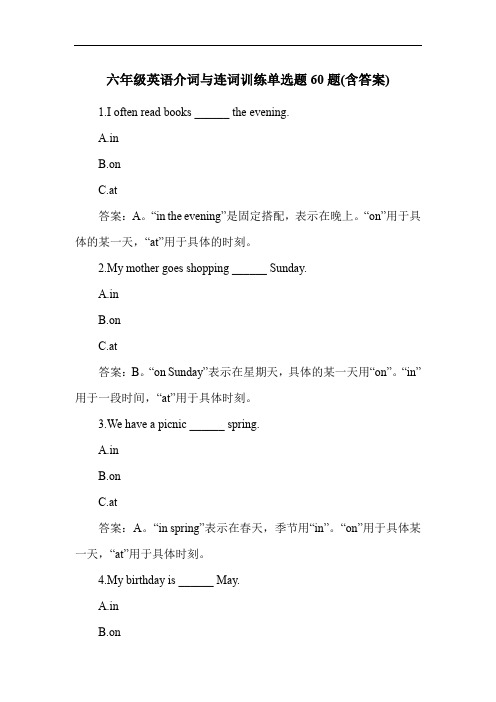
六年级英语介词与连词训练单选题60题(含答案)1.I often read books ______ the evening.A.inB.onC.at答案:A。
“in the evening”是固定搭配,表示在晚上。
“on”用于具体的某一天,“at”用于具体的时刻。
2.My mother goes shopping ______ Sunday.A.inB.onC.at答案:B。
“on Sunday”表示在星期天,具体的某一天用“on”。
“in”用于一段时间,“at”用于具体时刻。
3.We have a picnic ______ spring.A.inB.onC.at答案:A。
“in spring”表示在春天,季节用“in”。
“on”用于具体某一天,“at”用于具体时刻。
4.My birthday is ______ May.A.inB.on答案:A。
“in May”表示在五月,月份用“in”。
“on”用于具体某一天,“at”用于具体时刻。
5.I get up ______ six o'clock in the morning.A.inB.onC.at答案:C。
“at six o'clock”表示在六点钟,具体时刻用“at”。
“in”用于一段时间,“on”用于具体某一天。
6.They go to school ______ Monday to Friday.A.fromB.onC.at答案:A。
“from Monday to Friday”表示从周一到周五。
“on”用于具体某一天,“at”用于具体时刻。
7.My father comes back home ______ night.A.inB.onC.at答案:C。
“at night”是固定搭配,表示在晚上。
“in”用于一段时间,“on”用于具体某一天。
8.We have an English class ______ Wednesday afternoon.B.onC.at答案:B。
六年级英语介词与连词训练练习题30题(带答案)

六年级英语介词与连词训练练习题30题(带答案)1.I usually go to school ______ seven o'clock in the morning.A.atB.onC.in答案解析:A。
at 用于具体的时刻前;on 用于具体的某一天;in 用于较长的时间段,如年、月、季节等。
题目中seven o'clock 是具体时刻,所以用at。
2.My birthday is ______ May.A.atB.onC.in答案解析:C。
in 用于月份前;on 用于具体的某一天;at 用于具体的时刻前。
题目中May 是月份,所以用in。
3.We often go swimming ______ summer.A.atB.onC.in答案解析:C。
in 用于季节前;on 用于具体的某一天;at 用于具体的时刻前。
题目中summer 是季节,所以用in。
4.My father goes to work ______ Monday to Friday.A.fromB.onC.in答案解析:A。
from...to...表示从……到……;on 用于具体的某一天;in 用于较长的时间段。
题目中表示从周一到周五,所以用from。
5.I get up early ______ the morning.A.atB.onC.in答案解析:C。
in the morning 是固定搭配,表示在早上;at 用于具体的时刻前;on 用于具体的某一天。
6.She was born ______ 2008.A.atB.onC.in答案解析:C。
in 用于年份前;on 用于具体的某一天;at 用于具体的时刻前。
题目中2008 是年份,所以用in。
7.We have a party ______ the evening of December 31st.A.atB.onC.in答案解析:B。
on 用于具体的某一天的上午、下午、晚上;in 用于较长的时间段;at 用于具体的时刻前。
六年级英语介词与连词训练练习题30题(答案解析)
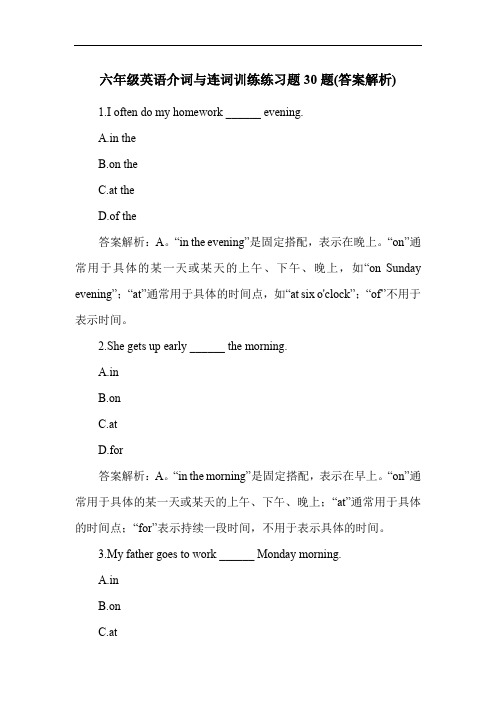
六年级英语介词与连词训练练习题30题(答案解析)1.I often do my homework ______ evening.A.in theB.on theC.at theD.of the答案解析:A。
“in the evening”是固定搭配,表示在晚上。
“on”通常用于具体的某一天或某天的上午、下午、晚上,如“on Sunday evening”;“at”通常用于具体的时间点,如“at six o'clock”;“of”不用于表示时间。
2.She gets up early ______ the morning.A.inB.onC.atD.for答案解析:A。
“in the morning”是固定搭配,表示在早上。
“on”通常用于具体的某一天或某天的上午、下午、晚上;“at”通常用于具体的时间点;“for”表示持续一段时间,不用于表示具体的时间。
3.My father goes to work ______ Monday morning.A.inB.onC.at答案解析:B。
“on Monday morning”表示在具体的某一天的上午,用“on”。
“in”用于泛指的上午、下午、晚上等;“at”用于具体的时间点;“of”不用于表示时间。
4.We have a music class ______ Wednesday afternoon.A.inB.onC.atD.to答案解析:B。
“on Wednesday afternoon”表示在具体的某一天的下午,用“on”。
“in”用于泛指的上午、下午、晚上等;“at”用于具体的时间点;“to”不用于表示时间。
5.They play basketball ______ Saturday.A.inB.onC.atD.for答案解析:B。
“on Saturday”表示在具体的某一天,用“on”。
“in”用于泛指的一段时间,如“in May”;“at”用于具体的时间点;“for”表示持续一段时间。
六年级英语介词与连词训练练习题30题含答案解析

六年级英语介词与连词训练练习题30题含答案解析1.I usually go to school ______ seven o'clock in the morning.A.atB.onC.in答案解析:A。
at 用于具体的时刻前;on 用于具体的某一天;in 用于年、月、季节以及泛指的上午、下午、晚上等。
这里是具体的时刻七点,所以用at。
2.My birthday is ______ May.A.atB.onC.in答案解析:C。
in 用于年、月、季节等;on 用于具体的某一天;at 用于具体的时刻前。
这里是月份五月,所以用in。
3.We often have a picnic ______ Sunday afternoon.A.atB.onC.in答案解析:B。
on 用于具体的某一天的上午、下午、晚上;in 用于年、月、季节以及泛指的上午、下午、晚上等;at 用于具体的时刻前。
这里是具体的周日下午,所以用on。
4.My father gets up early ______ the morning.A.atB.onC.in答案解析:C。
in the morning 是固定搭配,表示在早上。
at 用于具体的时刻前;on 用于具体的某一天。
5.She goes to bed late ______ night.A.atB.onC.in答案解析:A。
at night 是固定搭配,表示在晚上。
in 用于年、月、季节以及泛指的上午、下午、晚上等;on 用于具体的某一天。
6.The meeting will start ______ ten minutes.A.inB.afterC.on答案解析:A。
in 加一段时间表示在一段时间之后;after 后面一般跟具体的时间点或时间段;on 用于具体的某一天。
这里是十分钟之后,所以用in。
7.He finished his homework ______ an hour.A.inB.afterC.on答案解析:A。
中考英语专项练习-介词和连词(6页)

介词和连词考点一、常用介词的种类及意义介词是一种用来表示词与词、词与句之间的关系的虚词,后面一般有名词、代词或相当于名词的其他词类,短语或从句作它的宾语。
1.表 示地 点位 置的 介词 2.表 示时 间的 介词3.表 示运 动方 向的 介词4.表示“在……之间”的介词:5.表示其他意义的介词at,in,on “在……”。
at 表示“小地方”;in 表示“大地方”; on 表示毗邻,接壤,to 表示在……范围外,不接壤。
above,over,on“在……上”。
above 表示“不一定正上方”,over 表示“正上方”;on 表示“物面相接触”below, under“在……下面“。
under 表示在…正下方;below :表示不一定在正下方。
in front of…:“在……前面”,in the front of “在…..的前部”in,on,at 在……时。
in 表示较长时间,如世纪、时代、年、季节、月及一般(非特指)的早、中、晚等;on 表示具体一天及其早、中、晚;at 表示某一时刻或较短暂的时间,泛指节日等。
in,after 在……之后。
“in+一段时间”表示将来的一段时间以后;“after+一段时间”表示过去的一段时间以后;“after+将来的时间点”表示将来的某一时刻以后。
from, since for“自从……”。
from 仅说明什么时候开始,不说明某动作或情况持续多久;since 表示"自(某具体时间)以来";for 指动作延续贯穿整个过程,后接时间段。
after, behind 在……之后across, through ,past 通过,穿过。
across 表示横穿,即从物体表面通过,与on 有关,为二维;through 穿过,即从物体内部穿过,与in 有关,为三维;past 从物体的旁边通过。
from...to...从......到......to, towards, onto, into ,out of :to 到某处去;towards 朝着某个方向去;onto 放到某物上面; into 进入物体内部 ;out of 从物体内部出来 up, down :up 向上;down 向下over, around :over 从上方跃过;around 环绕一圈 along 沿着between ,among :between 指“两者之间”;among 指在“三者或三者以上之间。
高考英语语法填空介词、代词、连词、冠词和情态动词知识点汇总

④表示“关于”、“对于”cry over the silt milk
⑤表示“一面……,一面……”talk over a cup of tea
⑥表示“以上”、“超过”over and above, cost over £5
②表示“和”、“与”quarrel/argue with, go with, have nothing to do with
③表示“用”cut it with a knife, have no pen with which to write
④表示伴随状态walk with a stick, with no hat on
④表示理由、原因“因为”for fear of
⑤表示“代替,代表”substitute...for..., speak for
⑥表示“交换”(暗含一定的比例关系)translate word for word
⑦表示时间上、距离上,数量上的“历经……、多达……”for hours, last (for) one hour, run (for) a mile
⑦表示“关注”、“关照”look after, ask after you
above含义为“在……之上”,引申为“难于”、“所不及”、“超过”之意50 feet above sea level, above comprehension
under①表示“在……下”、“在……内部”、“在……脚下”under a tree, under a hill
分析:因these proverbs是名词,且不是作主,宾,表,前面很有可能填介词;句意是“在中国这些成语故事背后常常有有趣的故事”,表示“在......背后”,用介词behind。
九年级专项练习题介词连词和关系代词的用法及区别练习
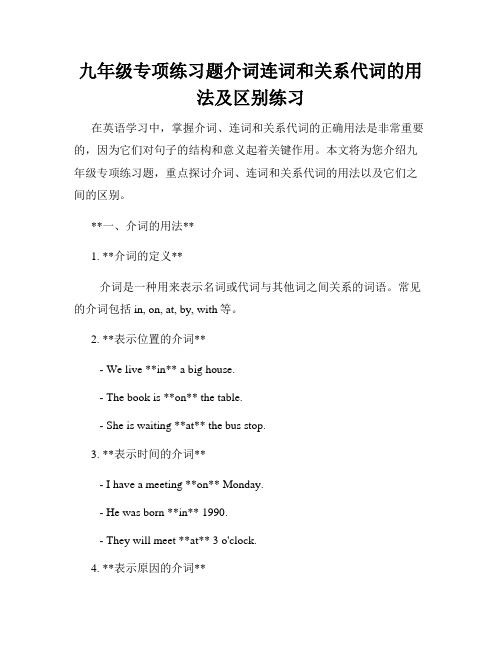
九年级专项练习题介词连词和关系代词的用法及区别练习在英语学习中,掌握介词、连词和关系代词的正确用法是非常重要的,因为它们对句子的结构和意义起着关键作用。
本文将为您介绍九年级专项练习题,重点探讨介词、连词和关系代词的用法以及它们之间的区别。
**一、介词的用法**1. **介词的定义**介词是一种用来表示名词或代词与其他词之间关系的词语。
常见的介词包括in, on, at, by, with等。
2. **表示位置的介词**- We live **in** a big house.- The book is **on** the table.- She is waiting **at** the bus stop.3. **表示时间的介词**- I have a meeting **on** Monday.- He was born **in** 1990.- They will meet **at** 3 o'clock.4. **表示原因的介词**- He failed the test **because of** his laziness.- She is happy **for** her friend's success.5. **表示方式的介词**- They traveled to the city **by** car.- She writes stories **with** great passion.**二、连词的用法**1. **连词的定义**连词是一种用来连接词语、短语或句子的词语,以使句子更加连贯。
常见的连词包括and, but, or, so等。
2. **并列连词**- I like tea **and** coffee.- She is tired, **but** she won't give up.3. **从属连词**- I will go to the park **if** the weather is good.- He studied hard **because** he wanted to pass the exam.4. **选择连词**- You can have ice cream **or** cake.- **Either** you come with us, **or** you stay home.5. **因果连词**- He didn't study, **so** he failed the test.- She worked hard, **therefore** she succeeded.**三、关系代词的用法及区别**1. **关系代词的定义**关系代词是一种用来引导定语从句并代替先行词的词语。
介词、连词讲解及练习

语法系列复习专题-----介词、连接词介词一、表示时间介词注意点:时间介词in、on、at、by、during的用法1.介词in用来表示一天中某段时间,指天、年、月、季节、周次等。
如:in the morningin+一段时间=in+一段时间's time(与将来时连用)如:We'll meetin three days' timewithin+一段时间(用于各种时态)如:You must finish reading the book within a week.你必须在一周内读完这本书。
2.介词on用来表示某一天或星期几,指明具体的时间。
如:on a rainy dayon Christmas Day3.介词at用来表示特定的时间、节日、年龄等。
如:at noon at Christmas4.介词by表示…的时候、到、等到…已经等用在天、时间的前面。
如:by 2 o’clock5.up to now=until now, from morning till night, for the time being暂时,at times有时,day by day一天天地,in no time立刻。
6.during是介词,不能引导从句。
二、注意一些表示地点场所介词短语的引伸、比喻含义in the mud在泥中,beyond hope绝望, in freezing在严寒天气中,in danger在危险中,in trouble在困境中,in public在公共场合中,under construction在建设中,on business出差,in the same boat处境一样,on sale在出售三、表示方式、手段、工具等介词(by,with,on,in)1.by:The blind men thought they could learn what the elephant looked like bytouching it./make a living by teaching/ by hand手工地,靠手工地,by letter,by post, by electricity, learn sth. by heart, struck by the beauty因美丽而着迷by means of用…手段,方式;by way of经由,取道于…learn English by/ over/ through/ on the radioHe was paid by the hour/ the day/ month/…他按时/日/月/…被付给工钱。
六年级英语介词与连词训练练习题30题答案解析版
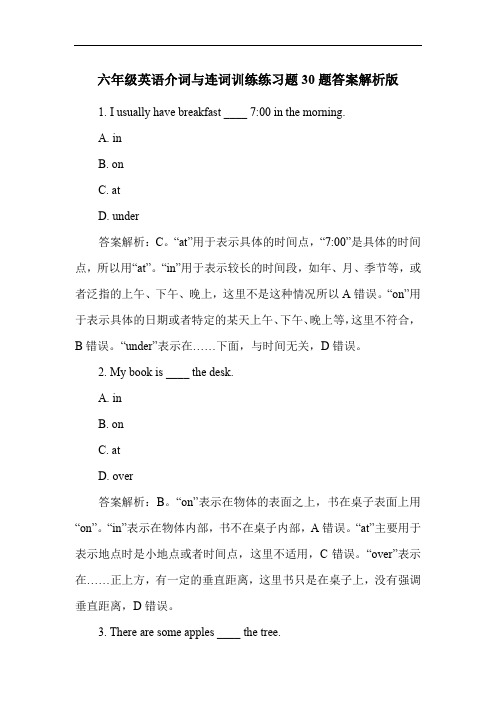
六年级英语介词与连词训练练习题30题答案解析版1. I usually have breakfast ____ 7:00 in the morning.A. inB. onC. atD. under答案解析:C。
“at”用于表示具体的时间点,“7:00”是具体的时间点,所以用“at”。
“in”用于表示较长的时间段,如年、月、季节等,或者泛指的上午、下午、晚上,这里不是这种情况所以A错误。
“on”用于表示具体的日期或者特定的某天上午、下午、晚上等,这里不符合,B错误。
“under”表示在……下面,与时间无关,D错误。
2. My book is ____ the desk.A. inB. onC. atD. over答案解析:B。
“on”表示在物体的表面之上,书在桌子表面上用“on”。
“in”表示在物体内部,书不在桌子内部,A错误。
“at”主要用于表示地点时是小地点或者时间点,这里不适用,C错误。
“over”表示在……正上方,有一定的垂直距离,这里书只是在桌子上,没有强调垂直距离,D错误。
3. There are some apples ____ the tree.A. inB. onC. atD. above答案解析:B。
表示树上长着的东西用“on”,苹果是长在树上的,所以用“on”。
“in”用于表示外来的东西在树上,比如鸟在树上用“in”,A错误。
“at”不符合这里的用法,C错误。
“above”表示在……上方,不一定是正上方,且这里表示长在树上用“on”更合适,D错误。
4. The cat is hiding ____ the bed.A. inB. onC. underD. beside答案解析:C。
“under”表示在……下面,猫躲在床下面用“under”。
“in”表示在内部,床不是猫能躲在内部的地方,A错误。
“on”表示在表面上,不符合躲在床下的情境,B错误。
“beside”表示在……旁边,与躲在床下不符,D错误。
介词及连词讲解练习
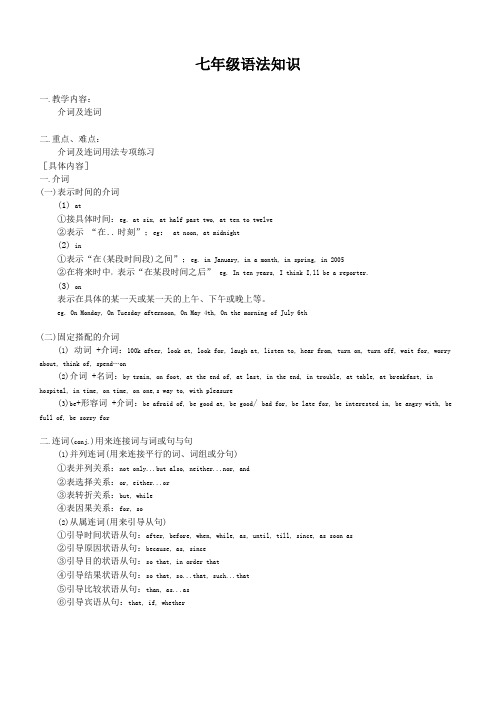
七年级语法知识一.教学内容:介词及连词二.重点、难点:介词及连词用法专项练习[具体内容]一.介词(一)表示时间的介词(1)at①接具体时间:eg. at six, at half past two, at ten to twelve②表示“在.. 时刻”;eg:at noon, at midnight(2)in①表示“在(某段时间段)之间”;eg. in January, in a month, in spring, in 2005②在将来时中,表示“在某段时间之后” eg. In ten years, I think I,ll be a reporter.(3)on表示在具体的某一天或某一天的上午、下午或晚上等。
eg. On Monday, On Tuesday afternoon, On May 4th, On the morning of July 6th(二)固定搭配的介词(1) 动词 +介词:100k after, look at, look for, laugh at, listen to, hear from, turn on, turn off, wait for, worry about, think of, spend…on(2)介词 +名词:by train, on foot, at the end of, at last, in the end, in trouble, at table, at breakfast, in hospital, in time, on time, on one,s way to, with pleasure(3)be+形容词 +介词:be afraid of, be good at, be good/ bad for, be late for, be interested in, be angry with, be full of, be sorry for二.连词(conj.)用来连接词与词或句与句(1)并列连词(用来连接平行的词、词组或分句)①表并列关系:not only...but also, neither...nor, and②表选择关系:or, either...or③表转折关系:but, while④表因果关系:for, so(2)从属连词(用来引导从句)①引导时间状语从句:after, before, when, while, as, until, till, since, as soon as②引导原因状语从句:because, as, since③引导目的状语从句:so that, in order that④引导结果状语从句:so that, so...that, such...that⑤引导比较状语从句:than, as...as⑥引导宾语从句:that, if, whether【典型例题】介词是一种虚词,它不能单独使用,后面要踉名词、人称代词宾格或动名词。
中考英语总复习 介词、连词(讲解+练习)
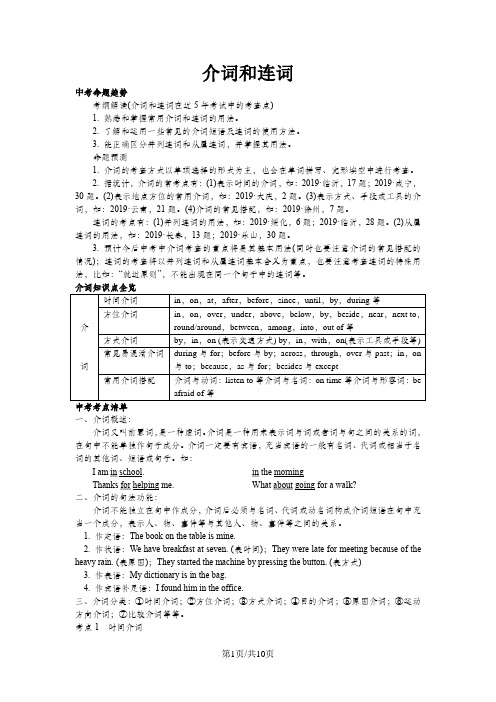
介词和连词中考命题趋势考纲解读(介词和连词在近5年考试中的考查点)1. 熟悉和掌握常用介词和连词的用法。
2. 了解和运用一些常见的介词短语及连词的使用方法。
3. 能正确区分并列连词和从属连词,并掌握其用法。
命题预测1. 介词的考查方式以单项选择的形式为主,也会在单词拼写、完形填空中进行考查。
2. 据统计,介词的常考点有:(1)表示时间的介词,如:2019·临沂,17题;2019·咸宁,30题。
(2)表示地点方位的常用介词,如:2019·大庆,2题。
(3)表示方式、手段或工具的介词,如:2019·云南,21题。
(4)介词的常见搭配,如:2019·徐州,7题。
连词的考点有:(1)并列连词的用法,如:2019·绥化,6题;2019·临沂,28题。
(2)从属连词的用法,如:2019·长春,13题;2019·乐山,30题。
3. 预计今后中考中介词考查的重点将是其基本用法(同时也要注意介词的常见搭配的情况);连词的考查将以并列连词和从属连词基本含义为重点,也要注意考查连词的特殊用法,比如:“就近原则”,不能出现在同一个句子中的连词等。
一、介词概述:介词又叫前置词,是一种虚词。
介词是一种用来表示词与词或者词与句之间的关系的词,在句中不能单独作句子成分。
介词一定要有宾语,充当宾语的一般有名词、代词或相当于名词的其他词、短语或句子。
如:I am in school. in the morningThanks for helping me. What about going for a walk?二、介词的句法功能:介词不能独立在句中作成分,介词后必须与名词、代词或动名词构成介词短语在句中充当一个成分,表示人、物、事件等与其他人、物、事件等之间的关系。
1. 作定语:The book on the table is mine.2. 作状语:We have breakfast at seven. (表时间);They were late for meeting because of the heavy rain. (表原因);They started the machine by pressing the button. (表方式)3. 作表语:My dictionary is in the bag.4. 作宾语补足语:I found him in the office.三、介词分类:①时间介词;②方位介词;③方式介词;④目的介词;⑤原因介词;⑥运动方向介词;⑦比较介词等等。
六年级英语介词与连词训练练习题30题含答案解析

六年级英语介词与连词训练练习题30题含答案解析1.I usually go to school ____ seven in the morning.A.atB.onC.in答案解析:A。
“at”用于具体的时间点,“seven”是具体的时间点,所以用“at”。
“on”用于具体的某一天,“in”用于一段时间,比如月份、季节、年份等。
2.My birthday is ____ May.A.atB.onC.in答案解析:C。
“in”用于一段时间,“May”是月份,属于一段时间,所以用“in”。
“at”用于具体的时间点,“on”用于具体的某一天。
3.We have an English class ____ Monday morning.A.atB.onC.in答案解析:B。
“on”用于具体的某一天或者某一天的上午、下午、晚上,“Monday morning”是具体的某一天的上午,所以用“on”。
“at”用于具体的时间点,“in”用于一段时间。
4.My mother gets up early ____ the morning.A.atB.onC.in答案解析:C。
“in the morning”是固定搭配,表示在早上。
“at”用于具体的时间点,“on”用于具体的某一天。
5.I do my homework ____ the evening.A.atB.onC.in答案解析:C。
“in the evening”是固定搭配,表示在晚上。
“at”用于具体的时间点,“on”用于具体的某一天。
6.The school is ____ the park and the hospital.A.betweenB.behindC.in front of答案解析:A。
“between...and...”是固定搭配,表示在……和……之间。
“behind”表示在……后面,“in front of”表示在……前面。
7.The bookstore is ____ the left of the bank.A.onB.inC.at答案解析:A。
中考英语介词 连词练习题及答案

介词、连词【考点直击】1. 常用介词及其词组的主要用法和意义;2. 常用动词、形容词与介词、副词的固定搭配及其意义。
3. 并列连词and, but, or, so等的主要用法;4. 常用的从属连词的基本用法【名师点睛】1. 介词的功能介词是一种虚词,用来表示名词或相当于名词的其它词语句中其它词的关系,不能单独使用。
介词可与名词或相当于名词的其它词构成介词短语。
介词短语可在句中作定语,状语,表语和宾语补足语。
例如:The boy over there is John’s brother. (定语)The girl will be back in two hours. (状语)Our English teacher is from Australia. (表语)Help yourself to some fish. (宾语补足语)2. 常用介词的用法辨析(1)表时间的介词1)at, in on表示时间点用at。
例如:at six o’clock, at noon, at midnight。
表示在某个世纪,某年,某月,某个季节以及早晨,上午,下午,晚上时,用in。
例如:in the ninettenth century, in 2002, in may, in winter, in the morning, in the afternoon等。
表示具体的某一天和某一天的上午,下午,晚上时,用on。
例如:on Monday, on July 1st, on Sunday morning等。
2)since, after由since和after 引导的词组都可表示从过去某一点开始的时段,但since词组表示的时段一直延续到说话的时刻,因而往往要与现在完成时连用。
而after词组所表示的时段纯系过去,因而要与一般过去时连用。
例如:I haven’t heard from him since last summer.After five days the boy came back.3)in, afterin与将来时态连用时,表示“过多长时间以后”的意思,后面跟表示一段时间的词语。
2022年河北中考英语动词介词和连词专题练习题含部分答案

动词Ⅰ.词语运用1Li Lei is interested in English and he ________ (watch) BBC News every day.2. Miss Zhang ________(order) a dress online two weeks ago, but it hasn't arrived yet.3.The Great Wall is too high. I have difficulty ________(climb) it alone.4. I felt________ (relax) lying in the sun on the beach.5. My hometown is greener now. More and more trees are ________ (plant) every spring.6.Alice ________(stand) up and ran across the field after the rabbit.7.If no ________ (act) is taken, some of these languages will disappear.8. Uncle Chen has ________ (repair) more than five bicycles since last Friday.9.At present, living in the countryside may be a good ________(choose).10.Hearing the funny story, all the students began to l________ loudly.11. The manager will be so busy next month that he has toc________ a few unimportant meetings.12.His teacher ________(have) a home visiting to his home yesterday.13. He ________(take) part in the birthday party of his grandma. It was really a big surprise!14. Our English teacher is very nice. Everyone in our class ________(like) her.15. She ________(lose) her key, so she couldn't go home.16. She went home and ________(begin) to finish her homework. 17He ________(find) an old box in the corner and gave it to his mom.18. He is ________(advise) to leave as soon as possible.19.Until now, I have ________(learn)English for almost six years.20. Her dream is to be a great ________(sing), so she practices singing every day.21.The ________(drive) is not allowed to drive after drinking wine.22. Yuan Longping has made a great ________(achieve) in planting rice.23The local food in Xi'an attracted so many ________(visit).24.I have a mixed ________(feel) after knowing the exam result.25.He was admitted to a key university. How ________(excite)the news it is!26. (2020原创)She prefers to l________ to music rather thanplay sports.27.You should h________ in the homework before the next Englishclass begins.Ⅱ.单项选择1.You'll have to ________ the books because there aren'tenough for everyone.A. packB. sellC. chooseD.share2. We should ________ making a noise in the library.A. avoidB. preferC. practiseD. enjoy3. Through the stories behind the idioms, we would be able tofully ________ China's culture, history and tradition.A. understandB. searchC. compareD. imagine4. Huawei's newest smartphone is wonderful! You can ________it in half just like closing a book.A. handB. passC. foldD. cut5. The flowers in our classroom are beautiful and colorful. They________ great.A. soundB. smellC. tasteD. feel6.Yesterday I ________ a book about cooking in the bookstore.I want to learn a new skill.A. boughtB. soldC. heardD. took7I can't ________ what I said, which makes me very embarrassed.A. forgetB. rememberC. acceptD. receive8.I ________ the people who smoke in public. It makes me sick.A. likeB. tellC. hateD. change9. It is so lucky that I ________ the game. I just can't believeit.A. wonB. enteredC. failedD. passed10.When she ________ her performance, everyone stood up andcheered for her.A. beganB. playedC. endedD. worked11. I ________ my English dictionary to Tom. And he promisedto give it back tomorrow morning.A. lentB. broughtC. hadD. lost12She has ________ me with her good sense of humor.A. impressedB. warnedC. admiredD. reminded13. A two¬day visit to Hong Kong ________ him 3,600 yuan, buthe thinks it is worth the money.A. soldB. tookC. costD. hung14. What good news! Scientists have discovered a useful way to________ the waste.A. produceB. recycleC. requireD. protect15.To my surprise, the book I bought ten years ago still________ untouched.A. refusedB. remainedC. requiredD. reviewed参考答案Ⅰ.词语运用1. watches2.ordered3. climbing4.relaxed5. planted6. stood7. action8. repaired9. choice10. laugh11. cancel 12. had 13. took 14. likes15. lost16. began17. found18. advised19.learned/learnt 20. singer21. driver 22. achievement 23. visitors 24. feeling25. exciting26. listen 27. handⅡ.单项选择1. D2. A3. A4. C5. B6. A7. B8. C9. A 10. C11. A 12. A 13. C 14. B 15. B介词一、选择题1.There is something wrong ______ my eyes. I can't see clearly.A.of B.about C.to D.with2.It would be better if you add some chocolate ________ themilk.A.in B.of C.to D.with3.Every morning we discuss the business ________ breakfast. A.to B.for C.over D.in4.I am good at cooking fried eggs______________ tomatoes. A.with B.for. C.on. D.at5.Sally is very happy because she has got a present ____________ her mother.A.a B.from C.to D.for 6.Nanjing is _________ the south of China and China is _________ the west of Japan.A.in;to B.in;on C.on;to D.on;in 7.Mike’s mother was very angry __________ him and she shouted __________ him angrily because he got up too late this morning. A.with;at B.at;to C.for;to D.to;at 8.The boy is walking the road.A.through B.below C.under D.across9.-Did Lucy get first prize in the maths competition?-Yeah, Nobody knew the answer ___________ the last question except her.A.in B.with C.to D.for10.I’m going to interview someone ________ a noodle factory __________ my project.A.in… for B.at… to C.in… to D.at… for11.—We go to school from Monday to Saturday.—That is to say,you go to school every day ________ Sunday? A.including B.on C.to D.but12.—They are playing ______ another school football team onthe playground.—Yes, and I think they must win the match.A.beyond B.over C.against D.along13.He is famous _________ an actor, and he is my favorite actor.A.for B.to C.as D.with14.When I was in primary school, I used to play in the park_______ our school.A.between B.behind C.through D.over15.He suddenly returned ________ a rainy night.A.during B.in C.at D.on16.Last week we _______different kinds of food and drink_______ different countries.A.sell… from B.sold… ofC.sell… of D.sold… from17.The yellow leaves are very beautiful. Let's take photos them.A.with B.of C.to D.at18.We are good friends. We should share happiness andsadness_____ each other.A.for B.to C.with D.in19.I took his umbrella ________ for his is the same as mine. A.by mistakes B.by mistake C.by accidents D.by an accident20.I wonder if there is a bank_________ the store. A.between B.beside C.across D.next二、根据句意及所给图片,用in,on或under填空21.The computer is __________ the desk.22.— Are the books __________ the desk?— Yes, they are.23.The pens are __________ the pencil box.24.— Where is the orange?— It is __________ the desk.25.— Is the ball __________ the table?— Yes, it is.三、用以下介词完成句子,每个介词仅用一次.in, on, under, behind, next to(在...旁边)eg:The blackboard is __on___ the wall. 26.The ruler is _____ the floor. 27.The schoolbag is _____the chair. 28.A set of keys is _____the dictionary. 29.The pencil is _____the desk.30.The pen is _____ his hand参考答案1-5.DCCAB6-10.AADCD11-15.DCCBD16-20.DBCBB21.on22.on23.in24.in25.under26.on27.behind28.next to29.under30.in连词( ) 1. –I won’t go to the party tomorrow.--________ you told me you would. What’s happening?A. ButB. SoC. AndD. Or ( ) 2. Mike did something wrong, _______ the headmaster is talking with him.A. soB. butC. andD. or ( ) 3. Jim has been in the factory for two years _______ he left school.A. whenB. sinceC. as soon asD. whether( ) 4. Mike is good at playing basketball _______ Bruce does well in football.A. whenB. untilC. sinceD. while( ) 5. –Excuse me. Do you have a table for two?--I’m sorry, ______ there aren’t any seats now. Wouldyou mind waiting for a while?A. butB. andC. orD. so ( ) 6. You’d better do it _______ your mother did.A. whenB. asC. likeD. because( ) 7. Stop cutting trees, _______ the earth will become worse and worse.A. andB. butC. orD. then( ) 8. Do you want to stay at home _______ go shopping with us?A. andB. butC. orD. so( ) 9. He was riding to school _______ he was hit by a car this morning.A. whileB. whenC. asD. so( ) 10. The war was over about three months ago, _______ the American soldiers in Iraq are still having a lot oftrouble to deal with.A. orB. andC. butD.for( ) 11. The mountain was _______ steep _______ few people in our city reached the top.A. so; asB. so; thatC. as; asD.too; to( ) 12. Mr Brown knows little Japanese, _______ he can’t understand the instructions on the bottle of thepills.A. soB. orC. butD.for( ) 13. It’s raining outside. Put on more clothes, _______ you may catch a cold.A. andB. butC. orD.though( ) 14. –What is writing brush, do you know? --It’s used _______ writing and drawing.A. withB. toC. forD.by( ) 15. _______ my mother ________ my sister watches football games these days.A. Either; norB. Both; andC. Neither; norD. Neither; or( ) 16. Mr Smith is an English teacher _______ will teachus English next term.A. orB. andC. butD.so( ) 17. I may live _______ in a hotel _______ in a friend’s house.A. both; andB. either; orC. neither;nor D. between; and( ) 18. I’m sorry, _______ I can’t help you with your homework.A. andB. butC. orD.then( ) 19. This coat will not lose colour ________ it’s washed.A. untilB. tillC. beforeD. after( ) 20. I think we should get this computer, _______ it willtake up more space.A. butB. althoughC. andD. so( ) 21. Stop smoking, _______ you will get better soon.A. andB. orC. thatD. after( ) 22. Gray didn’t recognize his old classmate ________he was told her name.A. whenB. unlessC. soD. until( ) 23. I was about to leave the office _______ the telephonerang.A. whenB. afterC. beforeD. while( ) 24. A lot of new buildings have been put up in ouruniversity. It is no longer the same _______ it usedto be.A. like whatB. thatC. asD. what( ) 25. He is a scientist, ________ a singer as well.A. butB. norC. orD. and( ) 26. John fell asleep ________ he was listening to themusic.A. afterB. beforeC. whileD. as soon as( ) 27. ________ our football team failed in the match, wedid our best.A. ThoughB. ButC. BecauseD. As( ) 28. We bought Mary a present, _______ she didn’t likeit.A. andB. butC. orD. so( ) 29. It was very late, _______ the students still wenton repairing their desks and chairs.A. andB. orC. soD. but( ) 30. _______ China isn’t rich now, _______ we’re workinghard to make her richer and richer.A. Though; butB. Though; /C. Both; andD. Because; so( ) 31. –You’d better remember what I said yesterday,_______ others will laugh at you.--Sure. I’ll do it _______ you told me.A. or; asB. and; asC. or; afterD. and; after( ) 32. Though we students have _______ money _______ time,we try out best to help them.A. both; andB. neither; norC. either; orD. not; but( ) 33. I won’t believe you _______ I see it with my owneyes.A. ifB. whenC. untilD. while( ) 34. I must finish the work _______ I go home.A. beforeB. whenC. untilD. if。
(完整版)介词的用法及习题
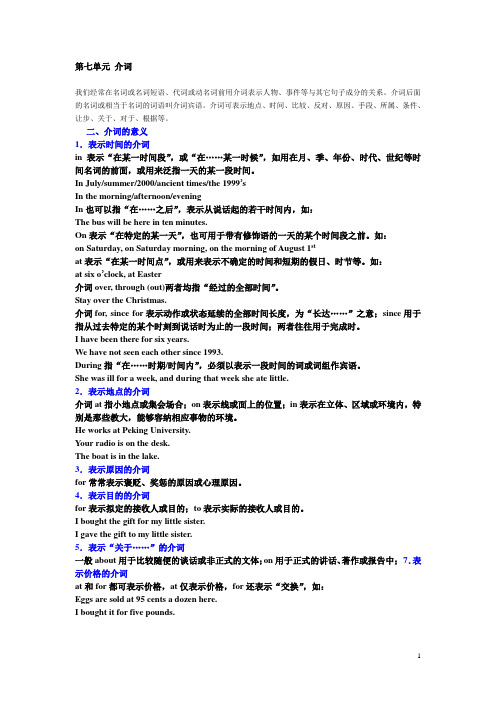
第七单元介词我们经常在名词或名词短语、代词或动名词前用介词表示人物、事件等与其它句子成分的关系。
介词后面的名词或相当于名词的词语叫介词宾语。
介词可表示地点、时间、比较、反对、原因、手段、所属、条件、让步、关于、对于、根据等。
二、介词的意义1.表示时间的介词in表示“在某一时间段”,或“在……某一时候”,如用在月、季、年份、时代、世纪等时间名词的前面,或用来泛指一天的某一段时间。
In July/summer/2000/ancient times/the 1999’sIn the morning/afternoon/eveningIn也可以指“在……之后”,表示从说话起的若干时间内,如:The bus will be here in ten minutes.On表示“在特定的某一天”,也可用于带有修饰语的一天的某个时间段之前。
如:on Saturday, on Saturday morning, on the morning of August 1stat表示“在某一时间点”,或用来表示不确定的时间和短期的假日、时节等。
如:at six o’clock, at Easter介词over, through (out)两者均指“经过的全部时间”。
Stay over the Christmas.介词for, since for表示动作或状态延续的全部时间长度,为“长达……”之意;since用于指从过去特定的某个时刻到说话时为止的一段时间;两者往往用于完成时。
I have been there for six years.We have not seen each other since 1993.During指“在……时期/时间内”,必须以表示一段时间的词或词组作宾语。
She was ill for a week, and during that week she ate little.2.表示地点的介词介词at指小地点或集会场合;on表示线或面上的位置;in表示在立体、区域或环境内,特别是那些教大,能够容纳相应事物的环境。
- 1、下载文档前请自行甄别文档内容的完整性,平台不提供额外的编辑、内容补充、找答案等附加服务。
- 2、"仅部分预览"的文档,不可在线预览部分如存在完整性等问题,可反馈申请退款(可完整预览的文档不适用该条件!)。
- 3、如文档侵犯您的权益,请联系客服反馈,我们会尽快为您处理(人工客服工作时间:9:00-18:30)。
介词和连词的用法(一) 表示时间的介词1. 英语里最常见的时间介词有: at, in, on, before, after 和from 。
2. at , in 和on 这三个词都表示时间。
at 主要指具体的钟点: at half past eight 在八点半in 一般指某一段时间:in January在一月份on 指具体在某一天: on Monday 在星期一3. before 和after 表示时间的先后顺序。
before 表示"在 .... 之前”。
You should wash your hands before eati ng.吃饭前你应该洗手。
after 表示"在 ..... 之后”。
They ofte n play basketball after dinner.他们放学后经常打篮球。
4. from 作时间介词含有“从 ... 开始”的意思,常和 to 连用,组成“ from …to …的结构,表示“从……到……”的意思。
We go to school from Monday to Friday.我们从周一到周五上学。
(二)表示方位的介词,也就是表示位置和地点的介词。
1. 小学阶段常见的方位介词有: on, i n, at, un der, over, above, below, about,around, betwee n 等。
2. on, over 禾口 above这三个词都有"在 ... 上面”的意思,但它们所表示的方位还是有些不同。
The boy is sleep ing on the desk.over 表示"在 .... 的正上方” There is a light bulb over my head.above 表示两个物体中一个在另一on 表示两个物体的表面相互接触。
如: There is a book on the desk.桌上有一本书。
那个孩子睡在地上。
,两个物体表面没有接触。
如:在我头顶上有一个灯泡。
个的上方,如:飞机上云层上飞行。
The pla ne is flying above the clouds. There are four lights above our head.There is a ball un der the chair. 椅子下面有一个球。
They are sitti ng un der a big tree. 他们正坐在一棵大树下面。
below表示"在..... ”的下面,不强调是否在正下方。
Their house is below mi ne. 他们家的房子在我家的下面。
4.in表示位置“在……里面”,也可以用来表示在一个很大的空间内。
The childre n are play ing in the room. 孩子们正在房间里玩。
All my books are in my bag. 我所有的书都在我的书包里。
5.around 表示 "在 ... 周围”。
There are lots of flowers around the house. 房子周围有许多花。
The childre n sat around the Christmas tree and sang happily.孩子们围坐在圣诞树旁边高兴地唱歌。
6. behind表示"在...... 的后面”。
Don' t hide yourself behi nd a tree. 别躲在树后。
7. in front of 表示"在...... 的前面”。
There are some trees in front of the house. 房子前面有一些树。
8.between表示"在两者之间”。
My home is betwee n the two mountains. 我家在两座大山之间。
Gua ng Jie sits betwee n Li Lei and Fa ng Nin g. 冠杰坐在李磊和芳宁之间。
(三)表示方式的介词9.常见的表示方式的介词有:by, with, i n 等。
10.by表示“靠……”,“用……”。
11.with表示“使用……”,“和……一起”,“有……”,“具有……”“带有……”。
12.in表示“用... (语言)”。
My father goes to work by car. 我父亲开车上班。
I can see with eyes. 我能用眼睛看。
I can speak in En glish. 我会用英语讲。
连词and 意思是“和”,表示并列和对称。
I can speak English and Chinese. I like apples, bananas and grapes.2. but 意思是“但是”,表示转折。
' t take medicine. 我感冒了,但我没吃药。
The skirt is nice, but it ' s too expensive. 这条裙子很漂亮,但太贵了。
3.so 意思是“因此”,“所以”。
It ' s dark, so I must go now.天黑了,所以我得走了。
You got up too late, so you missed the bus.你起床晚了,所以错过了公共汽车。
一、选择填空。
( ) 1. The Greens were watching TV ____________ I came in. A. before B. after C. when( ) 2. Jack was sad ____ he failed his math exam again. A. so B. because C. but( ) 3. The bus arrived ___ 7:30 a. m. A. on B. at C. in( ) 4. Your mouth is _____ your nose. A. under B. below C. near ( ) 5. We don ' t go to school ________ Saturday and Sunday. A. on B. inC. at( ) 6. Did you go to the zoo ___ foot? A. by B. on C. in ( ) 7. I write ___ my hand. A. in B. with C. by ( ) 8. Can you sing this song ____ English?A. inB. withC. on1. or 意思是“或者”,“还是”, 表示选择。
我会讲英语和中文。
我喜欢苹果、香蕉和葡萄Is your friend is a boy or a girl? 你的朋友是男孩还是女孩? Do you learn English or French?你学英语还是法语?注意:误) I don ' t like coffee and te a.正) I don ' t like coffee or te a. 我不喜欢喝咖啡和茶。
正) I like coffee and tea.我喜欢喝咖啡和茶。
I have a cold, but I don( ) 9. He learns English _____ TV.A. inB. onC. with( ) 10. Tony comes ______ Australia.A. fromB. toC. in( ) 11. Everyone is sitting ___ the floor, but Mr Brown is sitting a chair ____ the corner.A. over, in, onB. about, on, atC. on, on, in( ) 12. During the weekdays, Jim gets up early __ the morning and goes to bed late ___ night .But ____ weekends he sleeps until midday.A. on, at, atB. in, at, onC. in, in, at( ) 13. The mother is coming back ___ an hour.A. afterB. forC. in( ) 14. Don ' t worry, Tom will return ______ .A. before longB. long beforeC. long ago( ) 15. Paper is often made ___ wood.A. byB. inC. of二.介词填空1.Tony is ________ Canada.2.What is the name ________ the factory?3.Betty is English. What ______ you ?4.Where do you come __________ ?5.Do the students stay ________ home ________ Saturday ?6.The meeting ended __________ 6 .7.We' ll play football _____ class .8.—where are you from ?9.—I am ________ Beijing.10.Let ' s count the numbers ________ one ________ fifty.11.—Where shall we meet?12.—We' ll meet ______ home.13.He is good ________ swimming.14.Tom gets __________ at seven every morning.15. _______ Sunday morning, he played football with his friends.16.What' s wrong ________ you?17.It ' s time _______ breakfast.18.Can you sing a song _________ English?19.Please listen _______ me carefully.20.Don' t be late _______ this meeting.三.用and, or, but 填空。
